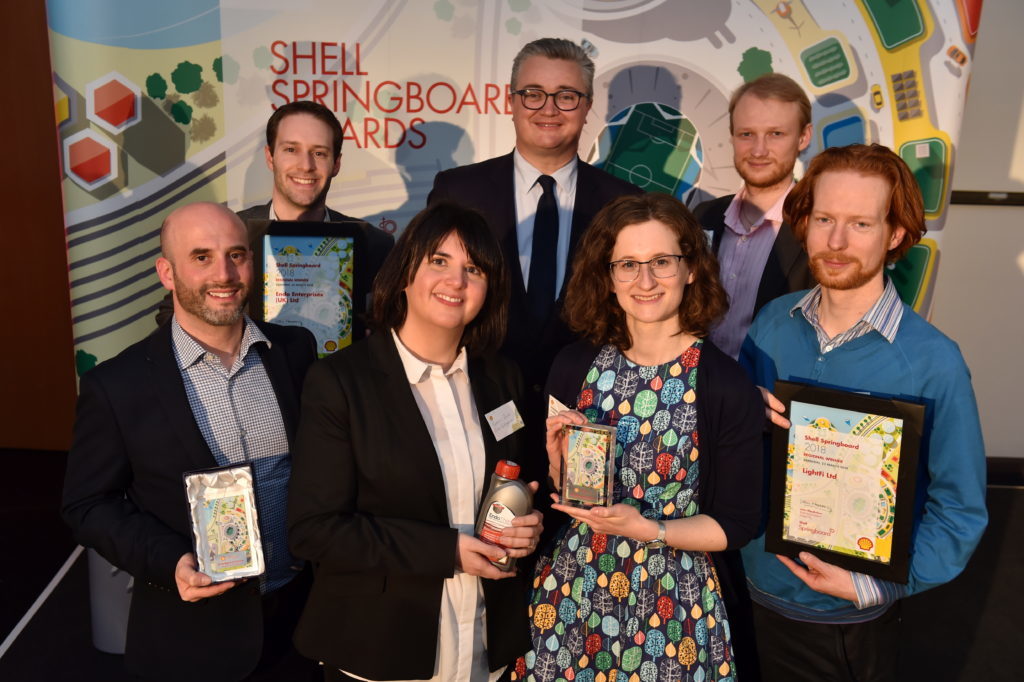
Three low-carbon technology developers have been selected from an incredibly strong pool of entrants to win the regional final of the Shell Springboard competition in Aberdeen.
Fledging businesses Carbogenics, Endo Enterprises and LightFi emerged from the pack to split £120,000 worth of no-strings attached funding.
They will now progress to a national final in London on May 10, where they compete against three other enterprises for a chance to win an additional £110,000.
The winners said they were proud that their ideas had been given the stamp of approval by a highly respected panel of judges at the Aberdeen Exhibition and Conference Centre on March 22.
Shell Springboard, which has awarded £4million to almost 100 low-carbon entrepreneurs in 13 years, has acted as a stepping stone on the route to success for many innovators.
Eighty-four percent of winners are still in operation five years after starting-up, compared to a national average of about 45%.
The judging panel included Ed Craig, of the Edinburgh Centre for Carbon Innovation, Morag McCorkindale, of Aberdeen Renewable Energy Group, Prof Susan Roaf, of Heriot-Watt University, Prof Stuart Haszeldine of Edinburgh University, and Andrew Lever, a director at The Carbon Trust.
They said picking just three winners from a shortlist of eight clean energy pioneers was extremely difficult, such was the quality of the entries.
Industry and political leaders who attended the event praised all of the entrants for the diversity and practicality of the technologies and products that were on show.
Edinburgh-based Carbogenics has developed CreChar, a carbon-based additive made from paper waste that can boost biogas production.
Endo Enterprises, from Warrington, Cheshire, has produced a liquid which can improve the circulation of water in central heating systems.
LightFi, from London, uses WiFi radio and smart algorithms to automate the control of lighting in rooms and provide data on how space is being used.
In addition to winning £40,000 each, they will receive advice on growing their businesses and guidance on getting the most out of other Shell initiatives.
Gareth Thistleton, Shell’s head of UK social investment, said he was excited by the quality of the entrepreneurs coming through the competition and the impact they could have on the UK’s energy sector.
Mr Thistleton said: “Shell is thrilled to be helping these young businesses and I can’t wait to see what their future holds.”
John MacArthur, Shell’s vice president, Group Co2, said the three winners stood out for their “impressive originality and inventiveness” and wished them luck at the national final.
He added: “It was fantastic to see such great innovation on show again. It was a really tight competition with high quality ideas.
“Year after year, the judges have a really difficult job setting the winners apart. All of the contestants are winners. They have all got fantastic ideas.”
Carbogenics co-founder Franziska Srocke said she was delighted to be going through to the next stage of the competition.
Ms Srocke said: “Carbogenics has huge potential to boost biogas production and Shell Springboard’s support is essential to the development of our carbon-based anaerobic digestion additive.”
Endo Enterprises managing director Benjamin Sallon said: “We are very proud that our Endotherm technology has been recognised by the Shell Springboard awards. The awards will make a big difference to our work to reduce energy consumption and share the cost and environmental benefits of doing so.”
LightFi chief executive Alex Bak said: “Winning this award is a brilliant moment for our business and we can’t wait for the next stage of Shell Springboard. Already, today’s funding will make a real difference to our work to roll out automated lighting and data driven insight into the use of space.”
Among the attendees was Alex Kemp, professor of petroleum economics at Aberdeen University.
Prof Kemp said: “It was great to see diverse ideas touching on all matters relating to a low carbon future being presented.
“It was very encouraging to see and it is encouraging that Shell is looking ahead to a time when there will be a need to progress to a low carbon future.
“It’s great that they are willing to sponsor the development of companies with different ideas.”
Lewis MacDonald, MSP for north-east Scotland, said: “It has been a great event. It’s fantastic to see such diversity across a range of entries and ideas.
“These are fantastic businesses. They’re not all from Aberdeen, but it is great to see these ideas gathering here to be judged and compared.
“Aberdeen is much more than an oil and gas city and Springboard can help us take the next step to being a capital for lots of energies.
“I’m sure we will see a lot of these entries again. It has been really positive.”
Shell Springboard is just one initiative Shell is using to assist others enterprises with low carbon energy solutions.
Shell LiveWIRE supports young entrepreneurs with innovative, smart and sustainable business ideas that meet the ever-increasing energy and resource needs of a fast-growing population.
Shell LiveWIRE has been running in the UK since 1982 and in that time has awarded 5,145 monetary awards, helping over 880,000 young people in the UK to explore starting their own business. Overall the programme has provided £5 million of funding.
The Anglo-Dutch firm is also playing its own part in the transition towards a low-carbon future. Shell intends to cut the net carbon footprint of its energy products by around half by 2050.
This will be achieved through a range of means including providing lower-carbon fuels, supplying natural gas for power and operating more efficiently.
Shell’s New Energies business, set up in 2016 and focusing on new fuels and power, supports this ambition.
